Remember “Field Day” in elementary school? For many kids, a day dedicated to games and competition was probably one of the best days of the year. Those games were favorites because they included everyone, promoted teamwork and cooperation, and brought a high level of excitement and energy to the group.
One of the best ways to create that same energy and enthusiasm for your clients and members is to organize special “game” days. Yes, your daily workouts are creative and energizing, but if you want to stand out from other health and exercise professionals, try adding a quarterly “Field Day” event to your programming. Your options are endless. For example, you could hold the event “off site” and meet in a local park for a morning of fitness and fun. Or make it a family event and double the fun and sweat.
To help you get started, here are three games that kids and adults are sure to love.
Cardio Kickball (ideal for a large group of 20 or more people)
Objective: Increase participants’ heart rates while improving their speed and agility. This is a continuous, fast-paced kickball game. Participants in the outfield need to get the four kickballs to the center hoop (by the pitcher) as soon as possible. All the participants up to “bat” kick the ball one time and run around the bases as fast possible.
Equipment: Five hula hoops and four kickballs
Set Up: Use the four hula hoops as bases (1st, 2nd, 3rd, home) and place the fifth hoop in the center for the pitcher. Place the four balls inside that hoop. The team “at bat” lines up directly behind home plate and the outfield spreads out.
Playing and Scoring: The pitcher rolls the first ball. Once kicked, the kicker runs to each base without stopping, trying to get back “home as quickly as possible” As soon as the first pitch is kicked, the pitcher grabs the 2nd ball and rolls it to the next kicker. As the balls are being kicked the outfielders throw and run the balls back to the pitcher’s hoop. Remember, the pitcher cannot field or catch any of the balls—he or she simply stands and waits for a ball to be placed in the hoop, so it can be rolled again. The outfielders work together to get all the balls back to the hoop as quickly as possible.
If the pitcher goes to roll a ball and there is not a kickball in the center hoop, the team up to bat scores a run. You, the trainer, keep track of this. Every time the pitcher has to wait for a ball, the other team scores a run. If the last person up to bat gets home before all four kickballs are in the center hoop, that team scores an extra two runs.
You can play until a certain amount of points are reached or for a total amount of time.
Rules: There are no “outs” or “boundaries” in the game. The pitcher does NOT field the ball; his or her only job is to roll the ball to the kicker. Once all team members have kicked, the teams switch places. Once a person has kicked and returned home, have him or her stand to the side so that it’s clear how many people still have to kick.
This is a fast-paced game with numerous directional changes so make sure you lead a proper warm-up before beginning.
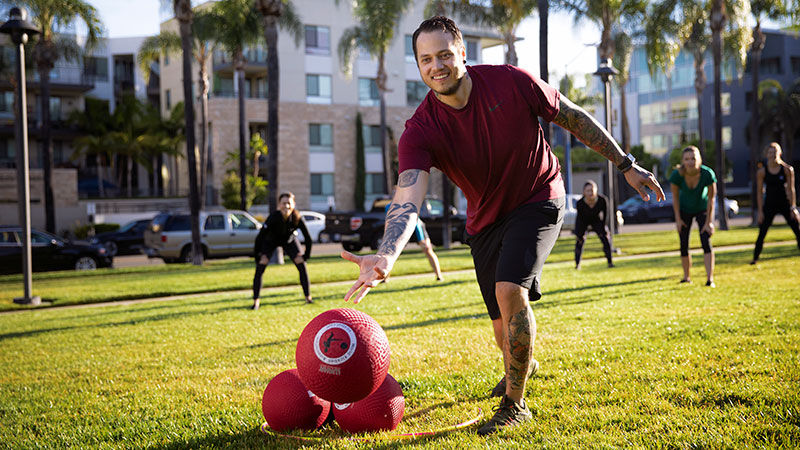
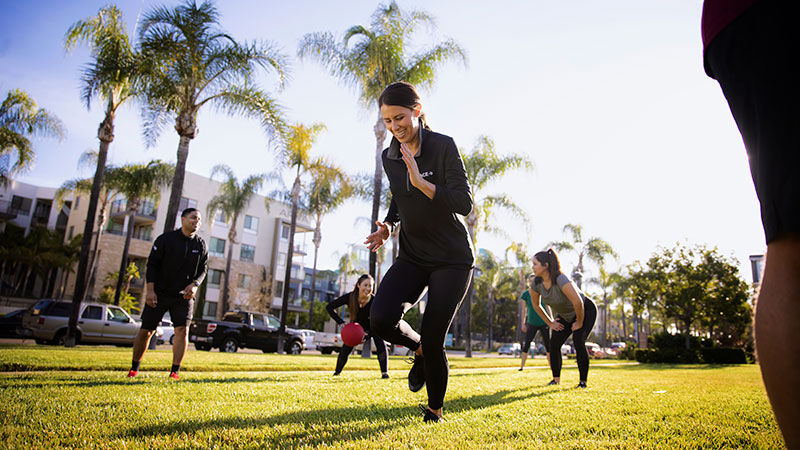
Super Catch
Objective: Increase participants’ heart rates while working on passing on the move. Participants pass the ball to all the people on their team while preventing another team from stealing it.
Equipment: Medium-sized balls (soft-skinned balls are great, but a playground ball or volleyball work as well)
Set Up: Divide the group into teams of four or five people. The number of teams determines the number of balls used in the game. Start with three fewer balls than teams (e.g., if you have seven teams, use four balls).
Rules and Scoring: Set up a large playing space with cones. Participants can travel anywhere inside the cones with or without the ball. They are basically playing catch. To make a successful pass, participants must be 5 feet apart. For every correct catch, the team gets one point. Everyone in the group must catch the ball before any repeating.
If a team doesn’t have a ball, they are working to steal/intercept one from another group. If you think this sounds like a giant game of “Keep Away,” you’re right! If there is an interception, the team that now has the ball passes their ball back and forth to all their teammates. The group that lost their ball moves on to another group and tries to steal their ball.
Play four-minute rounds. Reduce the number of balls used to make it more challenging.
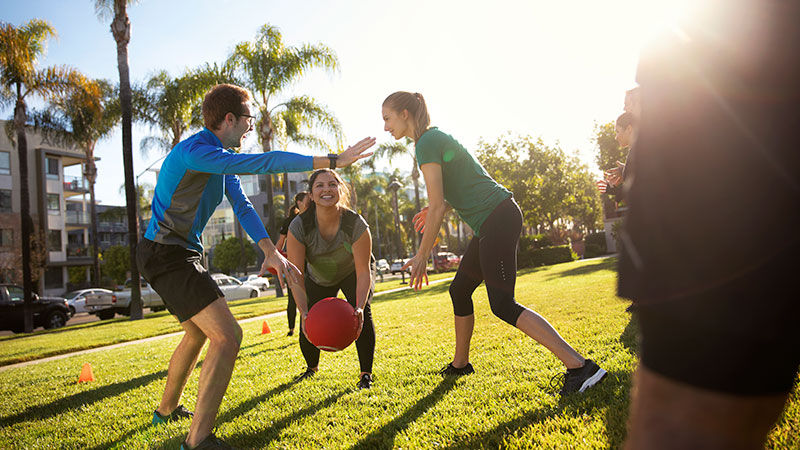
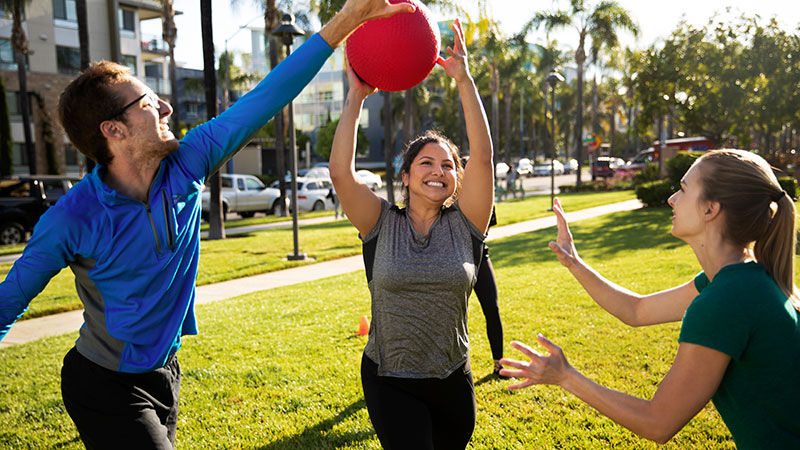
Demolition Hula Hut
Objective: Increase participants’ heart rates by having them throw balls at the other team’s hula hut, while also defending their own team’s hula hut.
Equipment: Six hula hoops for each team and soft-skinned balls (the number of balls needed depends on group size)
Set Up: Divide the group into teams of three or four people. In large playing space, set up boundaries in the shape of a rectangle. Make a line out of cones in the center to divide the playing space in half. Spread out the teams evenly, half on one side and half on the other. Each team gets six hoops to make their hula hut.
To create the hut; place one hoop down flat on the ground. Take two more hoops and place them inside the first hoop, leaning them in toward each other, like a teepee. Then take two more hoops and do the same on the other side. The final hoop is placed on top.
Rules and Scoring: While there are multiple teams, each team is throwing across the centerline at the other half of the teams’ huts. Each team tries to knock down the other teams’ hut by rolling or throwing a ball at it. In addition to throwers, the team can have defenders for their huts. Every time a team knocks down a hut, they receive one point.
If a hut is knocked down, the team must work together to rebuild it. No one can throw at the hut when it’s being built.
Play five-minute rounds and determine who had the most points at the end of each round.
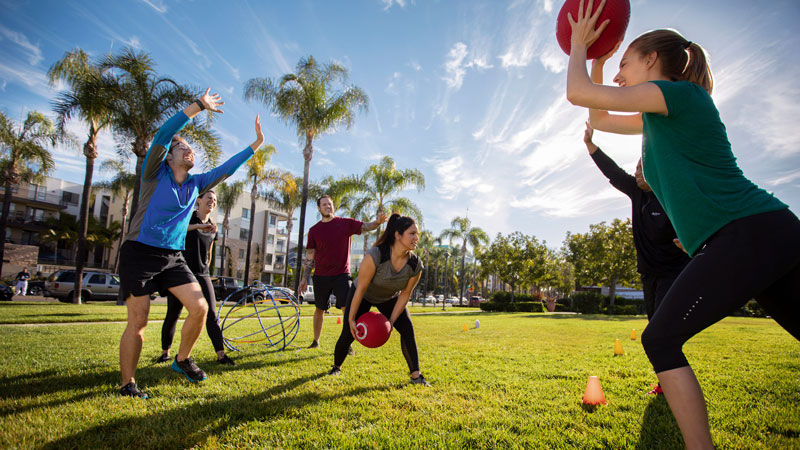
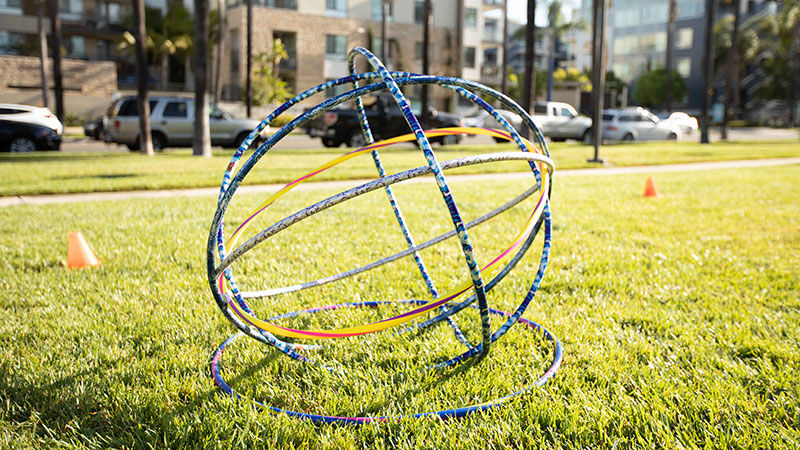
Interested in expanding your client offerings? Help your clients move more efficiently and effectively, while avoiding injury by becoming a Functional Training Specialist.




 by
by 







 by
by